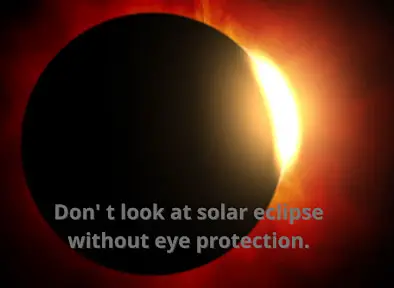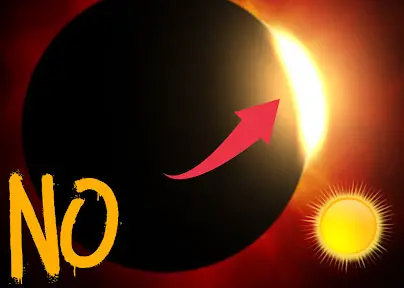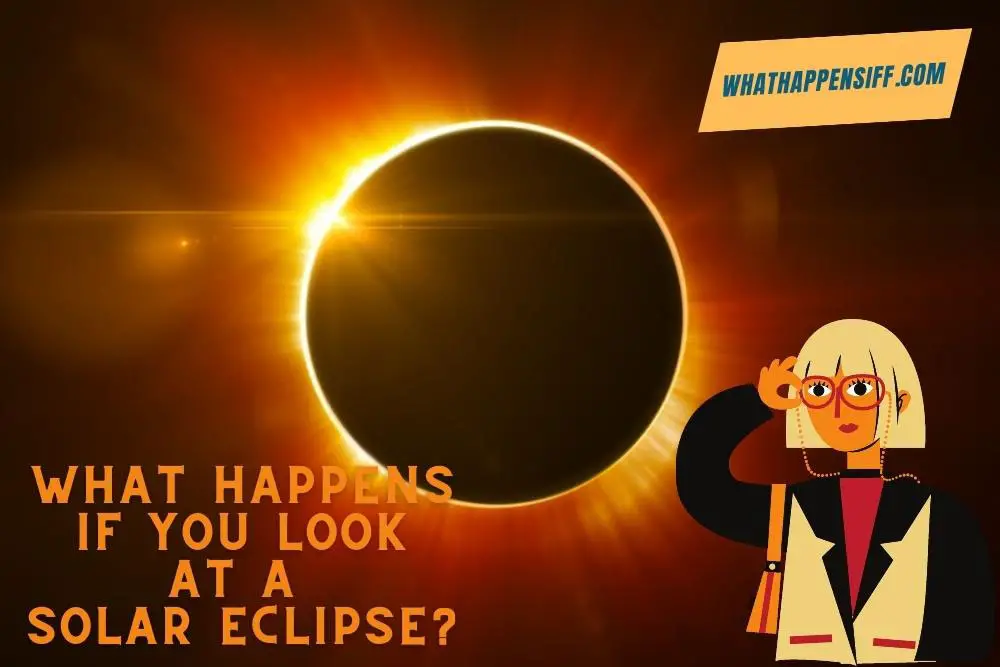The exquisite phenomena of nature like shooting stars, transits, and eclipses happen rarely. When we get a chance to view such spectacular happenings, we become impatient to see them. Isn’t it? But during a solar eclipse, the glare of the sun is so intense that our eyes can’t bear it. Since many questions disturb us. Is this the sun we see every day?
What happens to the sun during different phases of a solar eclipse? Is it safe to see the sun during a solar eclipse?
What happens if we look at a solar eclipse? Looking at the solar eclipse without eye protection will result in blindness. But the total solar eclipse is perfectly safe to view with the naked eye unless it’s an annulus. Use protective glasses, filters, or projected images to protect your eyes from dangerous UV light and dazzling sun.
Solar eclipses are worth seeing but with proper eye protection otherwise unless you will lose your vision permanently or temporarily. Sometimes the harmful effects of retinal burns are not obvious shortly after viewing the solar eclipse. But become worse as you age. Kids and elders are particularly more affected even if they have a short glimpse of the solar eclipse.
Since ancient times, eclipses are mostly connected with superstitions, magic, and evils. To this day, a solar eclipse is still considered bad for pregnant women and their children. Anyways, it’s a long dispute and is disowned by science. But when solar eclipses occur, not only humans but sea creatures, and animals are also fascinated by this.
Let’s read this interesting post to explore more about the charms and dangers of solar eclipses.
What Happens If You Look at a Solar Eclipse
Is it normal to look at the sun during a solar eclipse? Or, do you think it’s a manifestation of some impending reality or mysterious event? It can also make you think: What happens if you see a solar eclipse?

Before jumping into the article, it would be better to know the reality of solar eclipse and its different types. But keep in mind, Solar eclipses can be seen only in specific areas of the earth but with great caution and specially made eye protection.
What Is a Solar Eclipse?
As we know the moon orbits the earth, sometimes it arrives between the sun and the earth.
- A solar eclipse occurs when the moon comes in front of the sun while blocking the sunlight partially or completely. However, the outer surface of the solar corona radiates around the moon.
- During a partial solar eclipse, the moon blocks only a part of the sun, it also casts a shadow on that part of the earth. That’s why the blocked part of the sun looks dark or fades while the other part stays visible and bright.
- In a total solar eclipse, the sun is entirely obscured by the moon resulting in complete darkness for a short period.
- However, an annular eclipse is very similar to a total solar eclipse. But in this case, the apparent size of the moon is smaller. So, the sun is not obscured fully by the moon resulting in an extensively bright ring of light called the annulus.
Risks of Looking at a Solar Eclipse To Health & Eyes
No doubt, the solar eclipses are special and so exciting that we couldn’t resist looking at them. Despite its beauty, this cosmic phenomenon involves a lot of risks to your vision.
During a solar eclipse, the sun emits dangerous radiation that can damage the retina resulting in retinopathy. Therefore looking at the sun without protecting your eyes is quite harmful to the health of your eyes and vision as well. Kids are at most risk as their eyes are young and clear, and they are more tempted to stare.
Many people underestimate the hazards of the glaring sun and infrared rays on the eyes. They don’t even realize that they need certified eclipse eyewear to view the solar eclipse. Hence the risk is amplified in the case of kids and seniors. Looking at the sun with a naked eye can cause eclipse blindness or burn your eye nerves.
Of course, looking at the total solar eclipse is safe but the risk is always there as its life is too short and the shortest glimpse of UV glare is strong enough to cause serious retinal burns or vision loss. In some cases, the damaging effects of solar eclipses are realized after a few days.

What Happens If You Look At A Solar Eclipse
What happens when you look at a solar eclipse? Skylovers always lingered for the lucky chances to witness such spectacular happenings. But they remained ever ready to look at the solar eclipse.
Nothing wrong will happen if you look at the solar eclipse with your eyes well protected by some good filter or eclipse glasses. But your filter or eye protection must be scratch-free and slit-free. Because a minor cut or scratch can cause havoc on your retina.
Hence, the projected image of a solar eclipse is the more secure alternative.
What Happens If You Look at a Solar Eclipse Without Glasses
Looking at eclipses is very thrilling but what will happen if you look at the solar eclipse without glasses?
Although the radiant UV rays are damaging, they become even more damaging during a solar eclipse. So it’s extremely dangerous to look at a solar eclipse directly. It involves many risks for your vision.
Never try to see the sun without the right protective glasses whether it is a partial eclipse or a total or even annular eclipse. However, indirect viewing is another good option.
What to Do If You Look At a Solar Eclipse
What to do when you look at a solar eclipse? If you want to see the sun during the solar eclipse, you must wear special solar protection.
The safest way to look at the solar eclipse is the use of eclipse glasses or solar filters. But be cautious, homemade filters or ordinary sunglasses are not safe options. Don’t wear your old eclipse glasses that are more than 3 years older because these are no safer.
Never stare or look at the sun for more than 3 minutes because it will leave a long-lasting illuminated image of the sun on your retina due to overstimulation of the optic nerves.

What Happens If You Look At A Solar Eclipse With Naked Eye
What would happen if I looked straight at an eclipse of the sun? During the total solar eclipse, a stage comes when the moon completely encircles the sun and reveals its corona. At this point, it’s pretty safe to look at a solar eclipse. Hence the sun is fully blocked by the moon, therefore no infrared rays are released.
But be careful, as soon as the sun starts appearing, stop looking at once. Since the shortest glare of the sun is dazzling enough to rip your retina.
What Happens If You Stare at a Solar Eclipse
The total solar eclipse is one of the most captivating and spontaneous events. Neither camera nor any scientific tool can capture this amazing phenomenon of nature.
What Happens When You Stare at a Solar Eclipse?
Luckily, it’s pretty secure to stare at the sun for a short while during a total solar eclipse. But the partial eclipse is extremely harmful and can burn your retina or nerve cells. Hence, the total eclipse ends soon and a slight hint of a partial crescent can cause macular degeneration or even blindness.
Small kids are more in danger. If you are parenting kiddos, you must inform and control your kids not to stare at the sun ever.
What Happens If You Look into a Solar Eclipse
Of course, the bright phases of solar eclipse are rather tempting and we could not resist looking into it. Do you know what happens if you see a solar eclipse?
Special filters or projected images are safer options to observe the enchanted phases of a total or partial solar eclipse. You can see a total eclipse with or without optical aids but the bright disk is very damaging even the smallest crescent can burn your eyes.
Special care along with supervision is inevitable for children while enjoying the magic of a solar eclipse.
Let’s watch this amazing video!
A solar eclipse can cook your eyes: How to watch safely
Frequently Asked Questions
Why Does Solar Eclipse Damage Your Eyes?
During a solar eclipse, the sun emits dangerous infrared and UV rays with very luminous light that can make you blind. The total eclipse involves no danger but great care must be exercised while looking at the sun. Whereas the partial eclipse, is quite dangerous to the optical nerves and eye vision, no matter how small the crescent is. You must opt for special filters along with care while observing this awe-inspiring happening.
Is a Solar Eclipse Harmful to The Skin?
During a solar eclipse, the infrared rays and the illuminated disk of the sun are striking to the eyes and can induce eclipse blindness. Even the shortest exposure to UV light can damage the cells of the retina. But the side effects of a solar eclipse on the skin are not evidenced yet. However long exposure to direct sunlight without protecting your skin can burn your skin just as the solar eclipse to your retina.
To know more about what happens if you look at a solar eclipse just check out this video.
Bottom Lines
To conclude, it’s very important to protect your eyes from dangerous rays and the glare of the sun. You can lose your vision if you look directly at a solar eclipse. On the contrary, solar eclipses are always regarded as the prophecy of some strange happenings. Hence, a lot of controversy among different cultures still persists. But the hazards of the solar eclipse on human eyes are indisputable by all.
To be on the safer side, never look or stare at the sun with the naked eye or through a binocular whether it is a partial, total, or annular eclipse, or the everyday sun. It’s inevitable to use good eye protection, certified filters, or projected images as these are the safest options. Moreover, always inspect your solar protection before use and never use it again if torn, scratched, or damaged.


